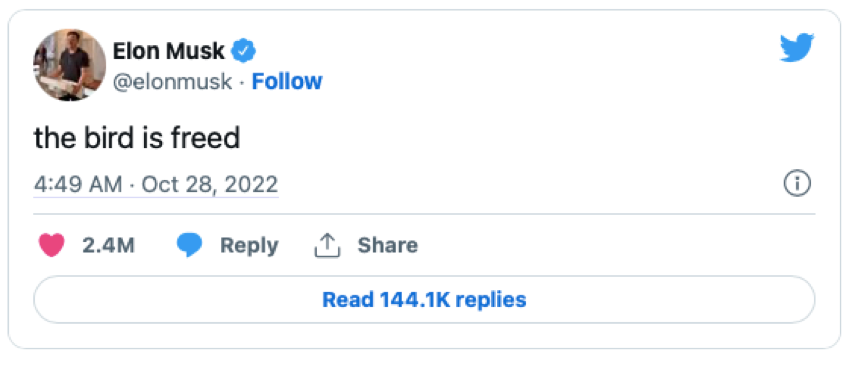Elon Musk, the world’s richest person, has finalised his $44 billion takeover of Twitter and has already started to take action, reportedly firing the CEO and two top executives.

After six months of legal wrangling, which forced Musk to reveal his embarrassing private texts regarding the deal, and chaotic business negotiations, the deal has finally been completed. Mr Musk, as the new owner of Twitter, tweeted “the bird is freed,” but took little time to celebrate his latest acquisition with news of CEO Parag Agrawal, CFO Ned Segal and head of legal policy, trust and safety Vijaya Gadde reportedly being fired according to the Washington Post and the New York Times.

However, despite the completion of the deal, there have serious concerns over the Twitter’s future direction. Critics are worried that with Musk being a “free speech absolutist”, the takeover could open the doors to hate speech and misinformation. Meanwhile, many conservatives are hoping Musk will make the app’s free speech policies more lenient and see it as a corrective measure to Big Tech censorship of politically incorrect views. Elon Musk has always openly criticised Twitter’s management and its moderation policies and believes it is “essential to have free speech and to be able to communicate freely.” One of the ideas he has talked about has been the reversal of bans on suspended users, which include former US President Donald Trump, but nothing has been confirmed as of yet. However, research on previous “free speech”-themed platforms like Parler and Truth Social have shown that if there are no moderation policies over what people post, the likelihood that the app becomes hate-filled and toxic increases dramatically. Nonetheless, Musk is determined, stating that he will use algorithms to promote and downlink content, arguing for “freedom of speech” but not “freedom of reach.” In a Twitter staff meeting he also stated, “I think people should be allowed to say pretty outrageous things that are within the bounds of the law, but then that doesn’t get amplified, it doesn’t get, you know, a ton of reach.” But Musk has not further elaborated on how he will decide what kind of content will get this reach and what won’t. This is a problem that Twitter has long struggled with and tried to solve so it will be interesting to see if these algorithms will allow people to express themselves without the app becoming a “free-for-all hell-scape” or whether Musk will have to simply accept that money really doesn’t buy everything.
A far less controversial issue that Musk has claimed he will fix is Twitter’s “bots” issue - accounts that post spam or inauthentic content and phishing scams. Although Twitter has previously stated that they form less than 5% of all accounts, Musk claims that the number is much higher, a shocking 20%. External research has determined that although the prevalence of bots may be under 5%, the reach of the bots in conversations overall can be as high as 20%. It is apparently a top priority and one that, unlike many of his other plans, users will appreciate.
One of the most ambitious plans Musk has talked about is making Twitter a “super app” called X, much like China’s WeChat, used to do everything from paying bills to ordering takeout to reading the news. Presently, 90% of Twitter’s revenue is made through advertising, but in his super app plans, he would want to make it less advertising-dependent and increase the revenue from subscriptions and through the future super app transactions. However Musk is not the only one pursuing this super app idea, both Snap’s Evan Spiegel and Uber have also begun to research into this new market. Furthermore, the US operates very differently to China, where there isn’t as much antitrust scrutiny preventing cross-industry monopolies, so it will be a lot harder to develop this app.
Reported plans to cut 75% of the employee base have already demoralised staff, to such an extent that a current anonymous employee said that everyone is either “leaving or planning to leave.” So although Musk has a number of ideas in how he is going to transform Twitter, he may have a difficult time fulfilling his goals if most of his staff has left.
Despite past complications regarding negotiations, Musk has not overcome the hardest part yet. In the past, his primary interests had been electric cars rockets and underground tunnels, now in hopes to diversify his portfolio, he has extended his reach to social media platforms. Musk may publicly talk about his plans, but what he says and what is actually done can and probably will be very different. Nonetheless, Twitter should be prepared for the ride of their lifetime.
Sources:



Comentários